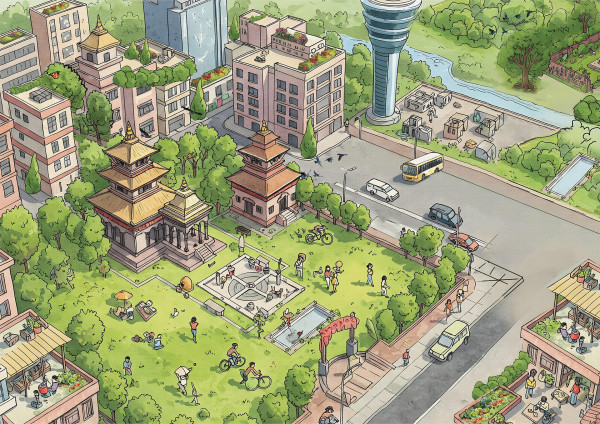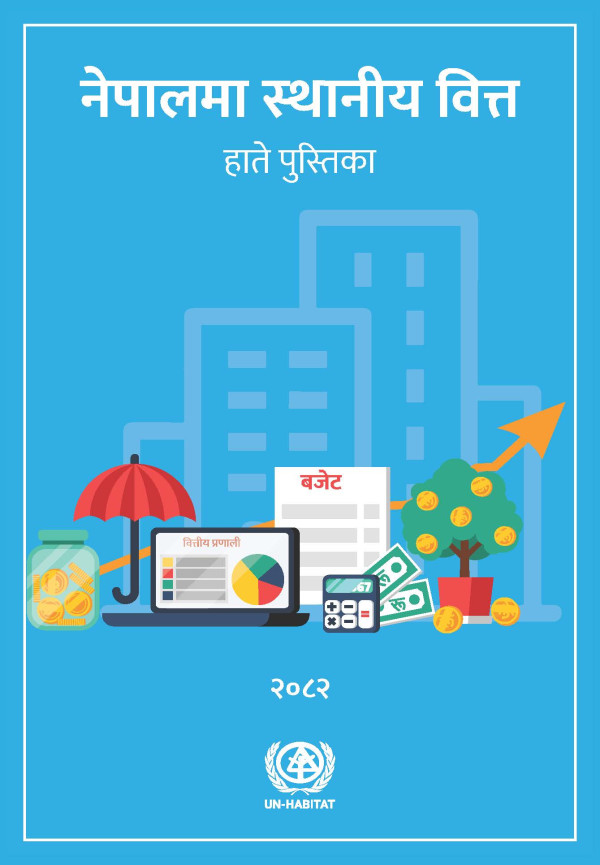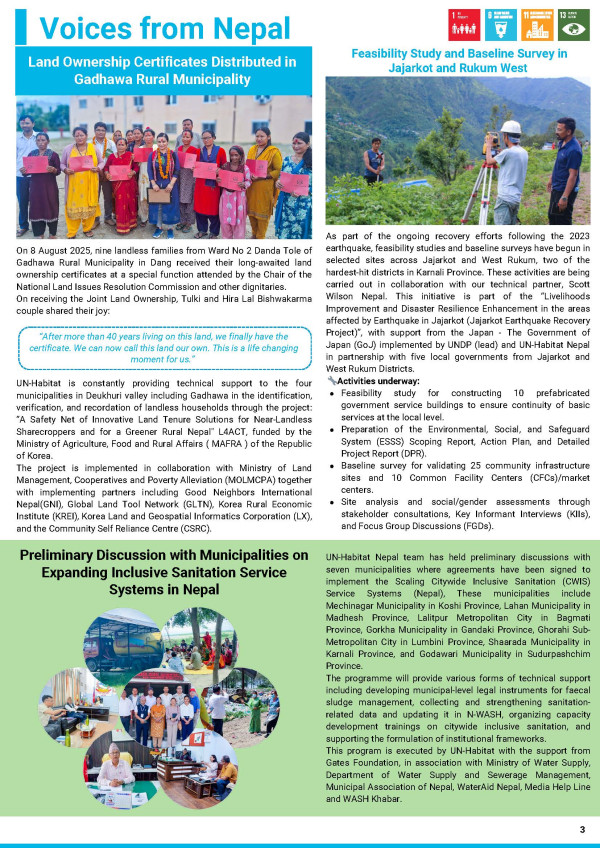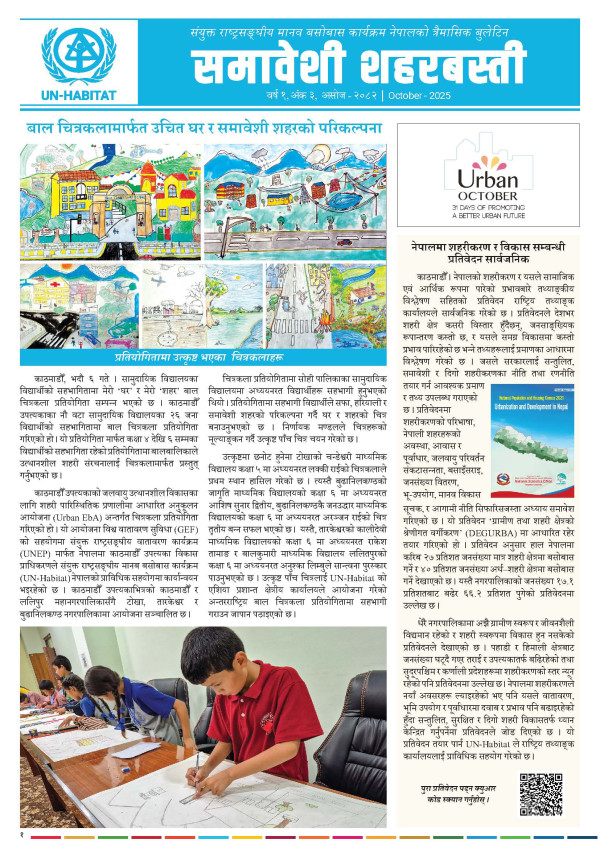Improving Livelihoods of Landless Farmers Through Climate Smart Agriculture
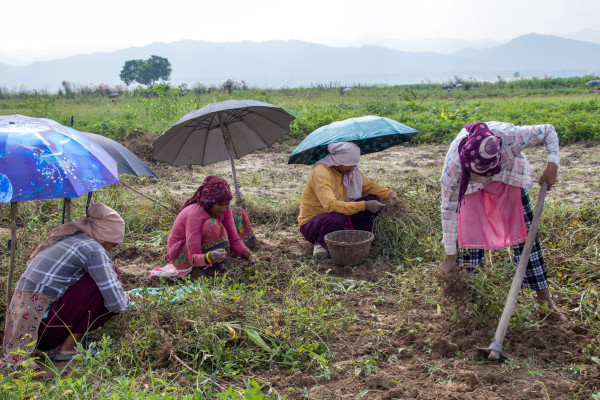
In Deukhuri Valley of Dang Nepal, landless and near-landless farmers are transforming subsistence farming into sustainable livelihoods through cash crops with secure access to land access and climate-smart agriculture interventions. Three Self Help Groups- the Sayapatri Land Right Farmer Group, Smart Land Right Farmer Group, and Ekata Land Right Farmer Group comprising 71 farmers including 61 females- were supported in the cultivation of improved varieties of groundnut like B-4, Rajarshree, Nawalpur Badam-1, Baidehi, Samriddhi, and Jayanti in 8 hectares of riverside area provided by Rajpur Rural Municipality Ward No 6 facilitated by the UN-Habitat project.
Picture 1: Sunita Chaudhary, Member, Sayapatri Land Right Farmer Group, Lamahi-07, Kholigaun is harvesting the groundnuts
Photo Credit: UNHabitat_MAFRA_CSA_Dang_Neelam_Tripathi
Sunita Chaudhary, a Member of Sayapatri
Land Rights Farmer Group, says “I was cultivating the traditional varieties of
groundnut since decades unaware of any improved varieties. With the help of
MAFRA-CSA program, I am now able to cultivate high yielding varieties of
groundnut”. Laxman Chaudhary, Chairperson of Ekata Land Right Farmer Group,
shared “This was my very first time of cultivating groundnut and found I am
getting multiple benefits: cash from the sales and the biomass remains for
feeding the cattle. I plan to preserve 30-35 kg of the produce as seed for the
next year”.
On another case, 56 farmers including 49 females from two Self Help Groups- the Milijuli Farmer Group and the Hasnapur Land Right Farmer Group from Lamahi Ward No 7- were provided technical support in the cultivation of Sukkha Dhan-3, a drought-tolerant paddy variety for cultivation in dry areas. The farmers are now engaged in the harvesting of the paddy crop. They have expressed satisfaction on the improved yield of the Sukkha Dhan-3 farming.
Picture 2: Mahabir Chaudhary harvesting the paddy in his field
Photo Credit: UNHabitat_L4ACT_Dang_Sunil_Chaudhary
Mahabir Chaudhary, a fifty-five-year-old
former freed Kamaiya from Gadhawa, describes the dramatic shift through access
to improved knowledge. "Previously, the produce was enough to feed my
family only three months, but now by cultivating the same area of land, I could
harvest enough o fed the family and additionally sell twenty-five to thirty
quintals annually. All twenty-four families in our group now grow enough to eat
and sell," he gives explanation. Only a limited number of farmers grew
this variety in the past, but with the program input, technical guidance, and
support from MAFRA-CSA larger number of farmers have adopted its cultivation
leading to improved yield and increased production in comparison to past years.
Beyond crop production, through the project Rapti Rural Municipality distributed Improved Cooking Stoves (ICSs) in coordination with Alternative Energy Promotion Center (AEPC).
Picture 3: Krishnamati Chaudhary using Improved Cooking Stove supported by program for preparing meal to her family
Photo Credit: UNHabitat_MAFRA_CSA_Dang_Sita_Chaudhary
Krishnamati Chaudhary received an Improved Cooking Stove that transformed both her household efficiency and her economic prospects. "It saves fuel and time. I use it to prepare stick food and sell in the local market, earning twenty-five hundred to three thousand rupees in the day" she shares. Krishnamati Chaudhary and her husband Janturam Chaudhary use the improved cooking stoves at their stick-food stall in the Haat Bazar which occur in every Friday at Shreenagar of Rapti Ward No 3.
Picture 4: Ramdewali Chaudhary installing blue sticky traps in her chilly farm for insect pest management
Photo Credit: UNHabitat_MAFRA_CSA_Neelam_Tripathi
Ramdewali Chaudhary is a member of Shanti
Swabalambhi Farmer Group, residing in Rapti-6, Pathargadawa. She is 56 years
old and has a family of six members. She had worked for about 18 years in brick
kiln. With the support of other organizations, she has started vegetable
farming. Now, she is cultivating vegetables in 0.133 ha of land with technical
support and guidance of MAFRA-CSA program. Previously she was unable to speak
and sell her produce to the market but now she is able to communicate with he
customers sell vegetables by herself.
She is generating fifteen to twenty thousand per month through vegetable
farming. Additionally, she has been cultivating crops in about 0.33 ha of land
through contract farming with the assistance of the program.
She shares “I was unknown to different types of insect traps which could be used for management of insects and pests. With the support of the program, I am using traps like yellow sticky traps, blue sticky traps and funnel traps in cauliflower, chilly and tomato field and it is working well for insect and pest management”. She further says” I am using the botanical pesticides in the vegetable crops of my farm; it works very well for the control of most of the insects. I am happy that I learned about this in the training from the program which is healthy to crops and cheap to prepare.
These transformations demonstrate the power
of linking secure land tenure with climate-smart agricultural practices. The
farmers are not merely producing more food but are becoming efficient to planning,
saving seeds, expanding cultivation, and investing in their livelihoods. The
interventions simultaneously restore degraded riverside soils while generating
income, creating environmental benefits alongside economic progress. The project
is implemented by UN-Habitat in collaboration with the Ministry of Land
Management, Cooperatives and Poverty Alleviation and partnership with Good
Neighbours International Nepal, Community Self Reliance Centre (CSRC), KREI and
LX.


